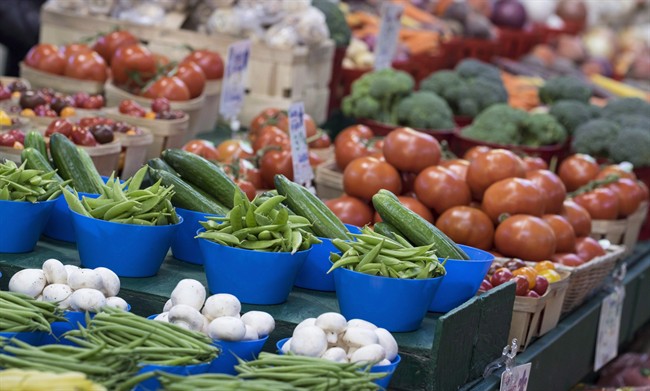Canada’s annual inflation rate accelerated to two per cent last month as higher costs for airfares and fresh vegetables offset cheaper prices at the pump, Statistics Canada said Friday.

Year-over-year prices picked up their pace in December after inflation was just 1.7 per cent in November, the agency said in its latest consumer price index. Economists had expected a year-over-year increase of 1.7 per cent for December, according to Thomson Reuters Eikon.
READ MORE: Lower gas prices send November inflation rate to 1.7% — weakest in 2018
Compared with a year earlier, the report said Canadians paid 28.1 per cent more last month for air transportation — mostly due to higher travel prices during the holidays. It was the biggest monthly rise in more than 30 years, but the price spike is in part due to StatsCan changing its methodology for measuring air fares, BMO chief economist Doug Porter wrote in a note to clients shortly after the release.
“Look for a big pullback next month,” he added.
Canadians also paid 14.9 per cent more for fresh vegetables last month. Lower gas prices, down 8.6 per cent, kept inflation from being even higher. Excluding the lower price of gasoline, inflation was 2.5 per cent in December.
Inflation was also up last month due to a 7.5 per cent boost in mortgage interest costs, a 3.8 per cent increase in restaurant bills and 5.1 per cent rise in passenger vehicle insurance premiums.

Get weekly money news
WATCH: Why experts don’t expect low gas prices to last
Among the main downward forces on prices, consumers paid 5.6 per cent less for hotels, 4.1 per cent less for natural gas and 5.7 per cent less for digital computing devices and equipment.
By region, British Columbia stood out from the rest of the country, with inflation up 3 per cent year-over-year in December. The reading was considerably higher than Ontario’s, which had the second-highest rate of inflation at 2.3 per cent.
“No mystery behind what’s driving the Pacific spike, as gasoline prices have been testing record highs in B.C. even as they slid elsewhere,” Porter wrote.
Overall, the year-over-year prices increased last month at a faster pace in seven provinces compared with November. Only Newfoundland and Labrador, Nova Scotia and New Brunswick saw prices rise at a slower rate.
Overall, the stronger December inflation reading could come as a surprise for the Bank of Canada, which said last week that it was expecting the measure to continue edging down to stay below two per cent throughout 2019, mostly because of lower gas prices. It did note, however, that the weaker Canadian dollar could apply upward pressure on inflation.
READ MORE: Bank of Canada keeps key rate at 1.75%, downgrades economic forecast
Statistics Canada’s report said the average of the central bank’s three core inflation readings, which leave out more-volatile items like gasoline, remained just under two per cent last month at 1.9 per cent.
The Bank of Canada, which aims to keep inflation between one and three per cent, can raise its trend-setting interest rate as a way to keep inflation from climbing too high. The bank pays close attention to core inflation ahead of its rate decisions.
Last week, Bank of Canada governor Stephen Poloz kept his benchmark interest rate unchanged at 1.75 per cent as the economy navigates what he described as a temporary period of softness created by a recent, sharp decline in world oil prices.
Poloz, however, reiterated that more rate increases will still be necessary “over time.” He has introduced five rate hikes since mid-2017 in response to the stronger economy.
— With files from Global News money reporter Erica Alini

_848x480_1420191811742.jpg?w=1200&quality=70&strip=all)









Comments
Want to discuss? Please read our Commenting Policy first.